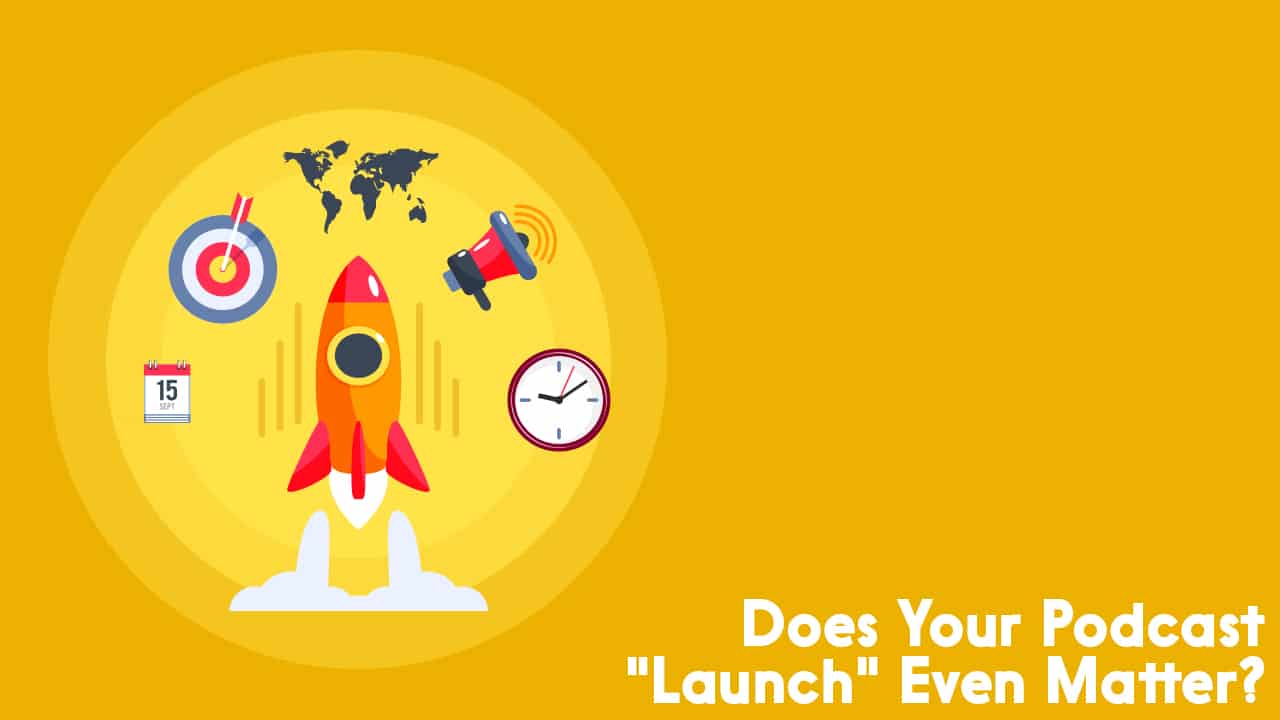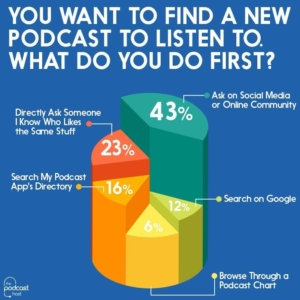Does Your Podcast “Launch” Even Matter?

For many aspiring podcasters, the podcast launch is the be-all and end-all. But, this is one area of podcasting that doesn’t need any more attention and work put into it.
Firstly though, what do I mean by “the podcast launch”?
There’s some really important parts to launching a podcast. The planning stages are key to how the show is going to grow in the long run. You need to ask yourself questions like, “Why am I podcasting?”, and, “Who am I podcasting for?”.
Instead, we see a lot of podcasters who focusing too much on two things. Those are podcast charts, and as many reviews as possible.
“I need to get this podcast launch absolutely perfect,” is a commonly heard phrase. But what’s the thinking behind it?
A podcast launch isn’t like the launch of a film, or the latest iPhone, or games console. Those things need to come flying out of the gate with high sales, and amazing feedback. Your podcast doesn’t.
Don’t take that statement as a lack of ambition or drive either. This is more a question of being smart about where you focus your time and energy. Think about the types of strategies that really do grow successful podcasts. Don;t think about those that tend to have little or no impact.
Let’s start with a hypothetical example.
Podcasting Is a Long Game
Imagine the best podcast you’ve ever heard.
It’s so in tune with your interests that it feels like it’s literally made for you alone. When the presenter speaks, it’s just like they are speaking to you. They always seem to know what you’re thinking, or what you’re struggling with. Best of all, they always seem to have your back.
You wake up to a brand new episode of this show every Friday morning. It always jumps straight to the top of your playlist. Your commute to work on a Friday just wouldn’t be the same without it.
Then one Friday, you play the latest episode, and the presenter announces that they’re closing the show down.
They explain that they weren’t happy with the launch they did, four years ago. Apparently it was a bit of a damp squib. They didn’t chart anywhere, and didn’t make New & Noteworthy. They hardly got any reviews, and only had a small core of listeners throughout their first year.
“I wanted the launch to be perfect,” says the presenter, “but, to be honest, it was a failure. I had to get it spot on, and I didn’t. So I see no other option now other than to pull the plug.”
Dumbstruck, you swiftly get out your phone to email them. You have to tell them how utterly ridiculous that all is. They’ve been putting out brilliant content for years, and they do so every week. The way they launched the show doesn’t matter to you in the slightest.
What matters is that they knew why they were podcasting, and who they were podcasting for. They committed to turn up consistently over the long haul, and deliver content tailored to the needs of their audience.
That’s how they grew into the position they are in now.
So I Shouldn’t Care About My Launch?
If you launch your podcast, find your show featured in a few charts, and get a chunk of ratings and reviews in the process, then brilliant.
I’m not saying you shouldn’t care about your launch period at all; it’s more a caution on how much time you spend on these things, and what your expectations are.
You should concentrate on creating the best content you possibly can, for that early core of listeners.
If you go in with a “boom or bust” mentality, and you end up not popping up in any charts, not getting many ratings, reviews, or downloads, then you’re going to feel like you’ve failed.
But the reality is that your podcast is at the very beginning of its life. It’s what you do after the launch period that truly matters.
Podcast Launch Myths & Misconceptions
If you’re going to put time, effort, and resources into anything, it’s good to be clear on why you’re doing what you’re doing.
Let’s have a wee look at some of the areas people tend to focus heavily on when launching a podcast. We’ll also look at the reasoning behind each one.
I Need Ratings & Reviews to Be Found by New Listeners
The idea here is that R&Rs “drive you up the charts” in iTunes/Apple Podcasts. Supposedly, it can get you featured in places like New & Noteworthy.
However, it’s actually your number of subscribers (a combination of new and all-time) that matter here.
Ratings and reviews can be nice for morale, as well as a bit of social proof. But, they’re not even nearly as important as some would have you believe.
For more on this, check out how do the iTunes podcast rankings actually work?
I Have 8 Weeks to Get in New & Noteworthy – If I Don’t, My Podcast Will Fail
A podcast can be featured in N&N at any point. Many of the shows you’ll find in there are a lot older than 8 weeks. These would be considered “noteworthy”, rather than “new”.
The confusion likely lies with the name, New AND Noteworthy. It’d be more accurate to call it New OR Noteworthy.
So the first piece of news is that your show can get featured in there at any time. The second piece of news is that it’s going to have a minimal impact on your overall growth (if any) .
 Are Podcast Charts Important For Audience Growth?
Are Podcast Charts Important For Audience Growth?
We recently ran a survey here at The Podcast Host where we asked 700+ podcasts listeners about their discovery habits.
When asked the question, “You want to find a new podcast to listen to. What do you do first?”, only 6% of respondents took to the podcast charts to find their next show to binge.
In fact, the three areas that relied on tech to provide podcast recommendations were the three least popular ones. Google search made up 12% of the overall response, whilst searching podcast listening app’s directories was a lowly 16%.
Add these all together and they’re still way short of the most popular way of discovering podcasts. 43% of these listeners would take to social media or online communities to ask other listeners for recommendations.
We can throw another 23% in the “word of mouth” camp too. Those folks opt to directly ask people they know who like the same sort of podcasts as they do.
So what can an aspiring, or pre-launch podcaster do with this data?
Word of Mouth Marketing
If you want to get listeners talking about your podcast and recommending it to others, then you need to give them something to talk about.
This goes back to the design and planning stages of your show. Check out how to define your podcast audience, and how to make your podcast unique, for an in-depth look at those topics.
If you’ve already done the groundwork though, then it’s about finding that early core of listeners. This can start with your own network of friends and family. But, it’s long term listeners you’re after, rather than one-off downloads. Is it really worth convincing your aunt who keeps her life savings in a biscuit tin under the bed, to listen to your podcast about bitcoin?
Being someone who’s active and helpful in your industry or any community built around your niche is important, too. If you’re the sort who answers questions in a pleasant and approachable way, you’ve more chance of being liked and respected.
When you’re launching your podcast, these people are going to want to check it out. It’s that early core of listeners you really want to focus on. Become that show that they feel like was made just for them. They’ll soon start sharing your episodes and enthusiastically telling others about the podcast. They’ll become your biggest marketers.
Create a Shareable Show
You might have brilliant content that your listeners want to share. But, if you make it difficult to do so, then you’re going to limit your growth.
Optimising your podcast website is vital here. You should also ensure that your show can be found anywhere people want to listen.
Once your show is set up to be shared, encourage your audience to do just that: share it.
Use it as your one and only call to action at the end of each episode in the early days. You’ve just given the listeners a whole show of valuable enjoyable content. Ask them to share it with one other person they think would find it useful. Most people will happily oblige.
And, if you run an interview podcast, then there’s scope for your guests sharing your episodes too. Check out the link there, for an in-depth look at that side of things.
I Need Results NOW
Admittedly, there are cases where the “soft launch” and the steady gradual growth approach is off the table.
An example might be a large-sized company who want to launch a podcast. Behind the scenes, there’s probably a bit of debate about whether or not running a podcast is worth it.
If the person championing the idea of podcasting wins enough support, they’ll be given the budget and resources to go ahead and create it. The problem is, those assigning that budget and resources are going to want to see measurable results in a short period of time.
It’s a much repeated phrase these days, but you can either pay for something in time, or in money. In this example, a marketing budget will need to be factored into the overall cost of the podcast. This can be a tough sell of course, because the podcast is supposed to be a marketing tool in itself . . .
Paid Advertising
If you have a pot of money set aside to market the show, then there are a few different options available to you.
Social media is the most obvious one these days. A bit of targeted advertising on platforms like Facebook, Twitter, and Instagram can help get the word out there. Depending on your budget though, it might actually be worth hiring a social media specialist as a community manager.
You can advertise on popular listening apps like Spotify and Overcast. Here, you have the added bonus of knowing that everyone yours ads reach will already be a podcast listener. And you can still target these ads to increase the chances of you finding your target audience. Advertising on, or sponsoring, podcasts with a similar audience to your own can work well on this front too.
You can create sponsored content for a popular blog in your niche or industry. This content needs to bring value to the reader. It’ll also give you the opportunity to link back to your podcast at the end.
Then there’s traditional media routes such as radio, television, newspapers, and magazines.
Paid advertising has no guarantees. Results will always going to hinge a lot on your show topic and niche. But if you spend your budget wisely, you can get those extra ears on your episodes. Then, it’s up to the quality of the content to get them to stick around.
Need Help With Your Podcast Launch?
Hopefully, that’s helped you weigh up the areas you’re going to spend the most time on when it comes to launching your podcast.
You can get more help from us with all of this and more by joining Podcraft Academy. That’s where you’ll find all our courses, resources, and community. We also run weekly live Q&A sessions, too!
 Are Podcast Charts Important For Audience Growth?
Are Podcast Charts Important For Audience Growth?